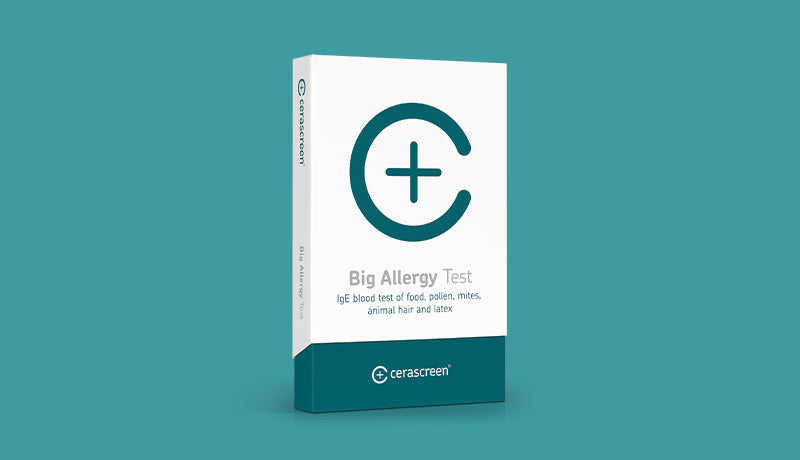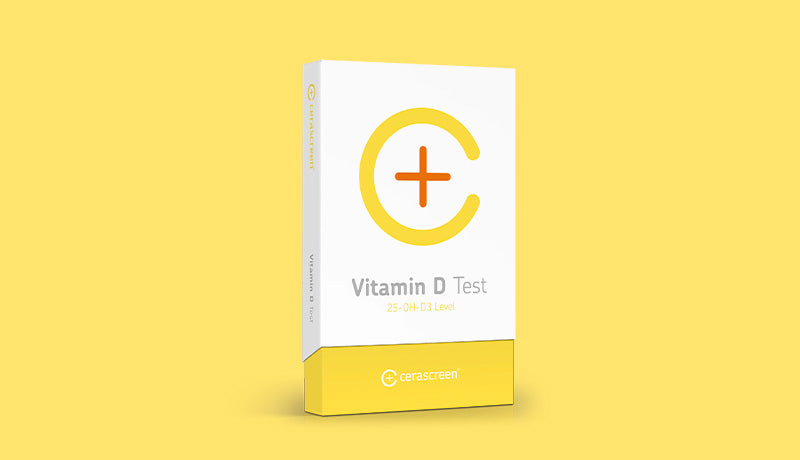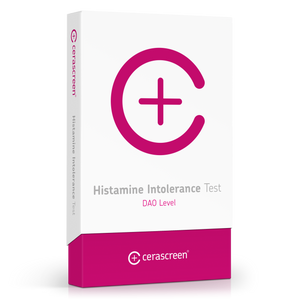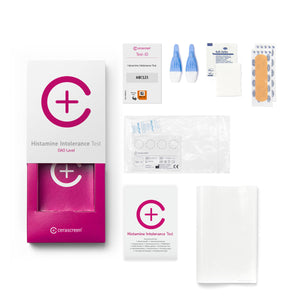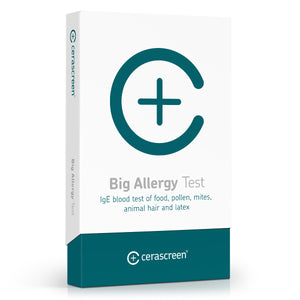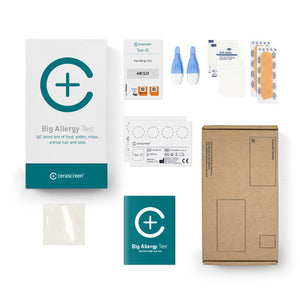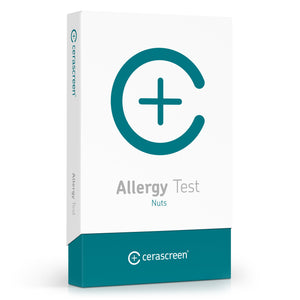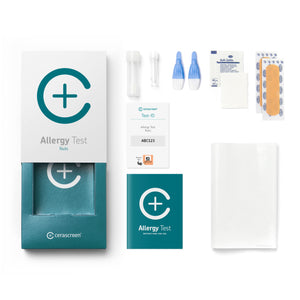product_id = 5079888756795variant_id = template_name =
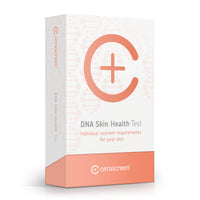
DNA Skin Test
About the test
Do you treat your skin mainly externally, with topical solutions? Then you may be missing a trick when it comes to your skincare routine. Nutrition and lifestyle influence the skin’s appearance from the inside - how exactly depends partly on your DNA. Different gene characteristics can cause skin problems to arise and the skin to age faster.
The cerascreen® DNA Skin Test analyses specific gene variants of five genes in a saliva sample. These gene variants provide information about your individual risk of developing oxidative stress, collagen degradation and increased sun sensitivity. If you are aware of these risks, you can take targeted countermeasures and help optimise your skin health and slow down skin ageing.
DNA Skin Test
- State-of-the-art DNA analysis of various gene variants
- Professional analysis in a certified medical laboratory
- Recommendations on how to protect your skin health
- Based on current scientific research
- Receive your results within three to four weeks after the sample’s arrival in the laboratory
Benefits of the DNA Skin Test
How susceptible your skin is to inflammation, UV rays and ageing is influenced by DNA, among other things. If you want to systematically improve your skin health, a DNA analysis will help you. It provides information about your skin’s individual requirements. This knowledge enables you to take measures that are tailored to your own DNA.
With the cerascreen® DNA Skin Test, you receive a DNA analysis that is the state of the art in biotechnology. You don’t have to wait in line, and you don’t have to go to a doctor. You can take your sample discreetly and conveniently at home. The professional analysis is carried out by a specialised medical laboratory.
Take advantage of our expertise: cerascreen® is the market leader for at-home medical sample-taking and send-in kits in Europe, with eight years of experience in the development and analysis of tests. We have developed more than 50 different approved sample-taking and mail-in kits (medical products), analyse around 150,000 samples per year and serve 19 different countries.

Result of the DNA Skin Test
As soon as your sample has been analysed, you will receive a notification via the My cerascreen® app or your user account on our website for your test results. You can view your results on your smartphone, tablet or computer ,and you can also print them out as well.
Find out from the laboratory analysis how to interpret the characteristics of the five analysed gene variants. Learn how to improve your skin health through clear recommendations on diet and lifestyle. Comprehensive health information will explain the role of your DNA in the health and ageing processes of your skin.
Frequently asked questions about DNA Skin Test
Why test skin health genes?
Do you want to preserve your vital youth for longer and keep your skin healthy? With a genetic test, you can find out which factors may be contributing to rapid skin ageing and skin problems.
The cerascreen® DNA Skin Test offers you insights into your genetics. Get to know your individual risks of developing oxidative stress, collagen reduction and increased sensitivity to sun better, so you can take targeted countermeasures, slow down the ageing process of your cells and optimise your skin health with measures concerning nutrition, lifestyle and health.
Please note: If the DNA analysis shows you have an increased risk of developing skin problems, it does not automatically mean that you will develop them! These genetic predispositions are probabilities and indicate the possibility of problems emerging. Moreover, the recommendations for skin health are also useful for people who do not show these predispositions.
Who should take the DNA Skin Test?
The test is an excellent choice for all people who want to improve their skin health and are interested in measures and recommendations that are best suited to them personally.
If you already have skin problems or feel that your skin condition has changed recently, the cerascreen® DNA Skin Test may be able to help you get to the bottom of the causes.
How does the DNA Skin Test work?
For the DNA Skin Test, take a small saliva sample from the oral mucosa with the cotton swab that is included in the DNA Skin Test kit. After using the swab, insert the saliva samples into the enclosed sample tube. Send the saliva samples to our medical partner laboratory by using the free return envelope. The lab will then carry out the DNA analysis.
The specialised medical laboratory carries out a comprehensive DNA analysis. How long the analysis will take depends on the quality of the sample provided - sometimes, the medical laboratory has to repeat the analysis multiple times. Therefore, it can take up to four weeks until you receive your individual test results.
How long does the analysis take in the laboratory?
Once your sample has arrived at the laboratory, it will be analyzed there by specialists. How long the analysis takes depends on the exact measuring method and the processes in the laboratory.
If the sample is sent on the correct days (Sunday to Tuesday), this makes it easier for the laboratory to adhere to the times.
For the DNA Skin Test, the laboratory analysis is usually completed within 3 weeks after the sample is received in the laboratory.
What do I have to consider when I take the test?
The higher the quality of the sample, the faster and more easily the laboratory is able to analyse it. You can contribute to this by adhering to the following guidelines for taking a saliva sample:
- Do not eat or drink anything for at least half an hour before collecting the saliva sample.
- Do not brush your teeth or use mouthwash at least half an hour before collecting the saliva sample.
- Do not smoke within 30 minutes of taking the tests.
- The sample must be stored in a dry place for 24 hours before it is sent. During this time, the sample dries via the aeration membrane at the bottom of the sample tube.
What will the results report tell me?
Based on four analysed genes, your results report provides you with information about three genetic tendencies when it comes to your skin health. For each, you will receive a possible interpretation of whether your genetic variants indicate a greater disposition.
The following aspects of skin health are investigated:
- Tendency to develop oxidative stress
- Tendency to break down collagen
- Sensitivity towards the sun
What kind of recommendations will I receive?
You will receive recommendations for each of the three skin health aspects assessed - find out more about these in the questions below.
We will also provide you with general tips for proper skin health that you can incorporate into your daily routine. This includes advice on nutrition, lifestyle and sunscreen.
Please note: If you already suffer from skin disease(s), follow our recommendations only after consulting a medical practitioner in order to check whether they will work in combination with your current therapy!
What influences the skin?
As a protective barrier, your skin is directly exposed to various environmental influences. UV exposure and exhaust gases can stimulate inflammatory processes in the skin. But an unhealthy diet as well as heavy nicotine and alcohol consumption also affect your skin health.
All these factors accelerate skin ageing due to oxidative stress: the skin dehydrates, loses elasticity and robustness. Wrinkles form more frequently. In addition, the skin becomes more susceptible to inflammation.
What does a tendency to oxidative stress mean?
Oxidative stress is the result of a large number of so-called free radicals in your body. Free radicals are oxygen molecules that can cause inflammation in cells and are, among other things, believed to promote cardiovascular diseases, cancer and skin ageing.
A genetic predisposition can possibly ensure that some people are more likely to develop free radicals and therefore oxidative stress. During oxidative stress, the body tends to shut down collagen production, often leading to Wrinkles and dry skin are possible consequences. Dry skin cracks more quickly, making it easier for bacteria and fungi to enter the skin and trigger inflammation or fungal skin infections.
One of the things that can help are the opponents of free radicals, the antioxidants. They protect the cells from the harmful effects of oxidative stress. Antioxidants can be supplied in a targeted way through nutrition; antioxidant nutrients include vitamins C, E and B2, zinc, selenium and iodine, as well as secondary plant compounds.
What does collagen degradation mean?
The protein collagen is mainly found in connective tissue. It keeps the skin robust and elastic. With age, collagen production decreases, which can cause the skin to become slack and inelastic. A genetic predisposition can additionally ensure that certain people break down collagen more frequently and quickly than others.
With the right nutrition, you can help your skin produce collagen. Important nutrients for collagen formation are vitamin C and the two amino acids proline and glycine. Proline and glycine are protein components found predominantly in animal products, such as eggs, fish and meat. Foods with a lot of simple carbohydrates (such as sugar, white flour and convenience foods), on the other hand, could inhibit collagen formation, so you should avoid them.
What does sensitivity to sunlight mean?
We need the UV light from the sun to form the essential vitamin D in the body. On the other hand, too much exposure to sunlight can damage the skin. UV radiation promotes collagen breakdown and damages skin cells in such a way that sunburn, inflammation and skin cancer could develop.
A genetic predisposition can possibly cause some people to react more sensibly to sunlight - skin damage is more likely to occur among such people. The right care can help. This includes adequate head and body coverage and the right sunscreen.
Why are children under 18 not allowed to take the test?
Our tests are not suitable for underage children and adolescents under the age of 18. Under 18s cannot activate the tests online and therefore cannot receive a test result. We ask that you do not administer the tests to your children either.
Children and adolescents need much closer supervision and counselling regarding medical tests and their interpretation. Testing with lancets and chemicals is not without risk and would need to be closely supervised by guardians. In addition, the reference values we give are always based on adult data. In the case of children, the risk of misinterpreting the results would be very high.
We want to fulfil our responsibility as a provider of medical products and ensure that children and adolescents are not unsettled by measurement results that are difficult for them to interpret. Since we cannot control whether the minors' legal guardians actually consent to the test being carried out and supervise them, we exclude tests for under 18s altogether.
If you are under 18 and have purchased a test, please contact our customer support.
Why does it take up to a week for the sample to reach the lab?
Please bear in mind that your results will not be analyzed in the UK but in Germany. For that reason, it can take up to a week for the sample to arrive at the lab. This does not affect the stability of the samples, as the method we are using is optimized for long transports.
Initially, your sample is sent to our collection center in the UK. From there, it is shipped to our central sample sorting facility in Germany, which then distributes samples to our partner laboratories. Once your sample is analyzed there, you will receive a notification and can access your result online.
Please check your mailbox regularly. We will notify you as soon as your sample is sent, arrives, or is analyzed.
Why does the test have an expiration date?
The cerascreen® test kits are CE-marked medical devices, which in turn include other certified medical components such as lancets, patches, and alcohol swabs used in blood tests.
Like most medical devices, these components have an expiration date to ensure that they remain safe and effective. Many of our sample carriers – such as dried blood cards or sample tubes – are chemically treated to keep your sample stable and analyzable in our laboratory. Over time, environmental factors can affect this treatment and compromise accuracy.
Our sterile, single-use lancets also carry an expiration date to guarantee sterility and safe use up to that time.
This is how it works
1. Test at home
Your test kit contains everything you need to take a small saliva sample. Then send the sample back to us free of charge in the enclosed return envelope.
2. View results online
After the evaluation in the medical specialist laboratory, you will have online access to your personal result report.
3. Act
Your access to the test results and the evidence-based findings and tips to improve your health: the my cerascreen® user profile on our website or our app.
